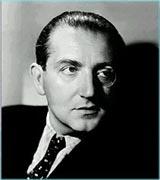 Stuart's Nite
Stuart's NitePizza, Substitute Ice Cream
'You have no existence except as my tool. The individual has no being except insofar as he is part of a machine. The individual is nothing; the machine is everything.'
— Dr. Mabuse, The Crimes of Dr. Mabuse
Fritz Lang Interview: How did you come to leave Germany at the height of your career and seek refuge outside the country?
I had made two Mabuse films and the theatre had asked me if I could make another one because they made so much money. So I made one which was called The Last Will of Dr Mabuse (1932).
I have to admit that up to two or three years before the Nazis came I was very apolitical; I was not very much interested and then I became very much interested. I think the London Times wrote about the fact that I used this film as a political weapon against the Nazis - I put Nazi slogans into the mouth of the criminal.
I remember very clearly one day, I was in the office and some SA men came in and talked very haughtily that they would confiscate the picture. I said if you think they could confiscate a picture of Fritz Lang in Germany then do it, and they did. I was ordered to go and see Goebbels, and they were not very sympathetic to me, but I had to go, maybe to get the picture freed, so I went.
I will never forget it - Goebbels was a very clever man, he was indescribably charming when I entered the room, he never spoke at the beginning of the picture. He told me a lot of things, among other things that the 'Fuhrer' had seen Metropolis (1926)and another film that I had made - Die Niebelungen (1924) - and the 'Fuhrer' had said 'this is the man who will give us THE Nazi film.' I was perspiring very much at this moment, I could see a clock through the window and the hands were moving, and at the moment I heard that I was expected to make the Nazi movie I was wet all over and my only thought was 'how do I get out of here!'. I had my money in the bank and I was immediately thinking 'how do I get it out?' But Goebbels talked and talked and finally it was too late for me to get my money out! I left and told him that I was very honoured and whatever you can say. I then went home and decided the same evening that I would leave Berlin that I loved very much.

The Permanent Magic of Fritz Lang: Fritz Lang was born in Vienna in 1890 and died in California in 1976. His life took in service in the First World War, spectacular fame in Germany in the 1920s, escape from the Nazis, and an often difficult period of reinvention in Hollywood. Famous for his autocracy and brutal treatment of actors, he was even dogged with the rumour that he had murdered his first wife. Others, of course, delighted in his company. Either way by the time of his death he was a legend.
His career coincided almost exactly with Alfred Hitchcock's, and the comparison between the two directors is often made. Both thrived in silent film, but easily adjusted to sound. Both moved from Europe to America and recreated their genius in a new culture. Yet while Hitchcock is instantly recognisable and his films are easily seen, Lang's work and reputation are much more obscure. Though no critic would question Lang's stature there's no consensus about which of his films are masterpieces. And substantial scholarly work on Lang is astonishingly scarce. David Thomson, in his Biographical Dictionary of Film, even says that 'Lang's adult stories are too concentrated for today's standards'. But this is too much of a simplification.
Lang was an extraordinarily varied and resourceful director. He was able as much as any other director to turn his hand to virtually all genres. In the 20s he made large-scale, expansive films, which often tested the limits of the silent cinema. Big-budget, epic, aimed at the mass audience, with the best special effects available at the time, Lang's world in the pre-sound era was peopled by spies, dragons, legendary heroes, dictators, master criminals and futuristic demagogues.





No comments:
Post a Comment